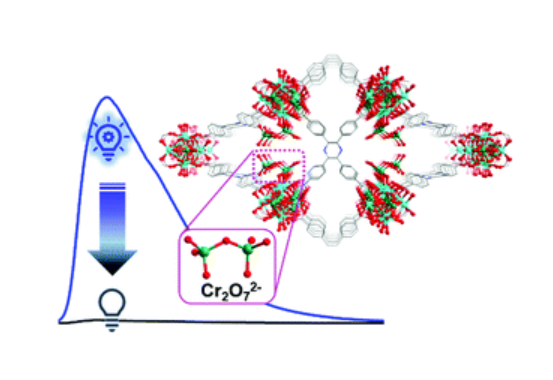
Kun Wu, Ji Zheng, Yong-Liang Huang, Dong Luo, Yan Yan Li, Weigang Lu * and Dan Li *

Abstract:Herein, we report the synthesis of three pairs of isostructural zirconium- and hafnium-based homometallic metal–organic frameworks (MOFs, termed Zr-MOF-1 and Hf-MOF-1, Zr-MOF-2 and Hf-MOF-2, and Zr-MOF-3 and Hf-MOF-3) with respective scu, sqc, and flu topologies by using the aggregation-induced-emission (AIE) ligand H4BTTB (4,4′,4′′,4′′′-(pyrazine-2,3,5,6-tetrayl)tetrabenzoic acid). As expected, all of them display excellent luminescence properties, and their potential application in the detection of Cr2O72− has been extensively studied. Among them, Zr/Hf-MOF-2 exhibits the high adsorption capacity for Cr2O72− (153 mg g−1 and 149 mg g−1, respectively), while Zr/Hf-MOF-3 demonstrates exceptional sensitivity in the detection of Cr2O72−, and the limits of detection are calculated to be 0.013 μM and 0.019 μM, respectively. The values are comparable to those of the best-performing MOF materials reported so far. Significantly, single-crystal X-ray diffraction studies revealed the exact location and configuration of Cr2O72− inside Zr/Hf-MOF-2. To the best of our knowledge, this is the first example of Zr/Hf-MOFs with direct evidence showing that Cr2O72− is linked to the Zr/Hf oxide cluster by replacing its terminal H2O/OH− groups within the single crystal.




